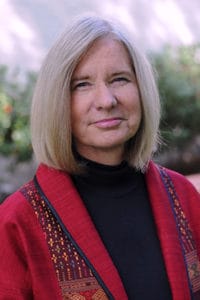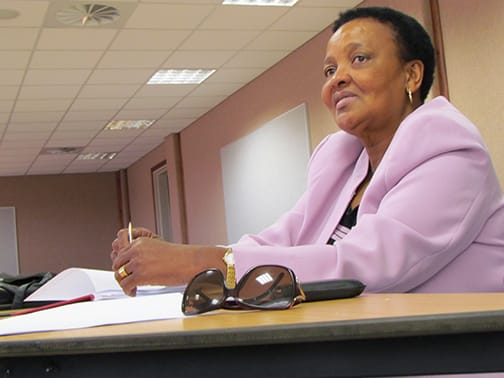Oral History and the Women of Botswana

As a historian of ancient Christianity, Karen Jo Torjesen’s research interests focus on where religion intersects with gender and culture.
For the past few years, that intersection led her to southern Africa.
It was there that Torjesen spent several months networking with feminist scholars in Namibia, South Africa, and Botswana. She also assisted the University of Botswana in the creation of a gender research center.
But it always came down to the women—the community organizers and village elders, the mothers and wives—and the stories they told.
Torjesen, the Margo L. Goldsmith Professor of Women’s Studies in Religion, will document those stories.

“We think an important part of what we have to do is to help African women to preserve their voice,” she said.
Next summer, Torjesen is launching a new research project in Botswana that will collect women’s oral histories and information about the role of religion in their lives. The research will also shed light on one of Botswana’s most troubling public health issues: an HIV/AIDS epidemic that has risen to critical levels.
Torjesen has spent nearly a decade teaching and developing graduate courses on gender, religion, and transnational feminism. In early 2014, she received a Fulbright Scholar grant that will support her as a visiting faculty member at Kenyatta University in Nairobi.
While teaching a course in 2012 at the University of Botswana—Torjesen previously helped establish its Gender Research Center— she met with activists and community leaders tackling issues such as domestic violence and children orphaned due to their parents’ death by HIV/AIDS.
It was an awakening experience.
“The most compelling thing about the time that I spent there was meeting the women, working alongside them, learning with them, working together,” Torjesen said. “That keeps pulling me back.”
In Botswana—where it is estimated that more than 300,000 adults are living with HIV/AIDS— the infection itself is only part of the problem. Many people will not get tested because of stigma driven by cultural, gender, and religious factors.
“If you’re a woman, your husband will throw you out,” Torjesen said. “If you’re a man, you lose everything. So it’s better not to know.”

For her latest project—Transnational Approaches to Gender, Culture, and Empowerment— Torjesen, CGU adjunct Professor Dionne Bensonsmith, and students Meg Rao and April Makgeong will collect data from women across a spectrum of religious faiths.
The project will be informed by the social sciences—to better inform public policy and public health decision-making—but utilize a humanities approach.
“What happens in the social sciences is you will gather a lot of data about women’s lives: the number of children, number of pregnancies, standard of living, etc.,” Torjesen said. “But this is a humanities process of meaning making. What sense do they make of their lives? What are their values? How they do construct a world? How do they hold together a family when someone is dying of HIV or because they lost their job because they are HIV-positive?”
The data will also shed light on the larger issue of women’s empowerment in Africa. Plans call for creating an online archive of the collected oral histories.
“To assemble primary research material on women, narrative is a really powerful tool,” Torjesen said.